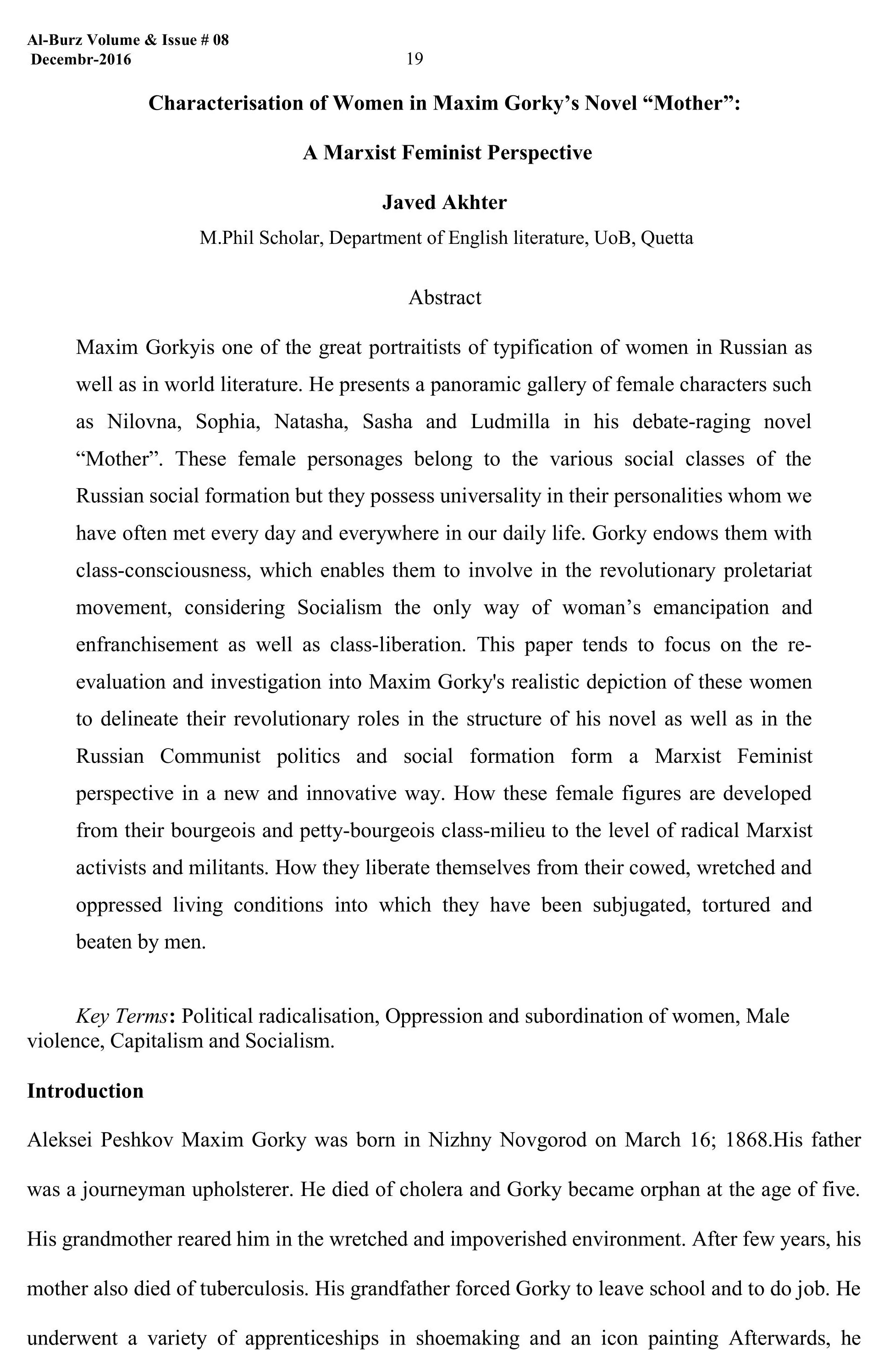Characterisation of Women in Maxim Gorky’s Novel “Mother”: A Marxist Feminist Perspective
DOI:
https://doi.org/10.54781/abz.v8i1.138Keywords:
Political radicalisation, Oppression and subordination of women, Male violence, Capitalism and SocialismAbstract
Maxim Gorkyis one of the great portraitists of typification of women in Russian as well as in world literature. He presents a panoramic gallery of female characters such as Nilovna, Sophia, Natasha, Sasha and Ludmilla in his debate-raging novel “Mother”. These female personages belong to the various social classes of the Russian social formation but they possess universality in their personalities whom we have often met every day and everywhere in our daily life. Gorky endows them with class-consciousness, which enables them to involve in the revolutionary proletariat movement, considering Socialism the only way of woman’s emancipation and enfranchisement as well as class-liberation. This paper tends to focus on the re-evaluation and investigation into Maxim Gorky's realistic depiction of these women to delineate their revolutionary roles in the structure of his novel as well as in the Russian Communist politics and social formation form a Marxist Feminist perspective in a new and innovative way. How these female figures are developed from their bourgeois and petty-bourgeois class-milieu to the level of radical Marxist activists and militants. How they liberate themselves from their cowed, wretched and oppressed living conditions into which they have been subjugated, tortured and beaten by men.
References
Bakhtin, M. M. (1981). “Epic and Novel.” Trans. Caryl Emerson and Michael Holquist.The Dialogic Imagination.Ed. Michael Holquist.Austin: University of Texas. Pp...3-40.
Bennett, V. (1987).“Maksim Gorky’s Mother’: A Primer for Consciousness Raising.” In: Russian Language Journal 41.138-139 (1987): Pp. 83-94.
Barrett, M. (1980).Women’s Oppression Today: Problems in Marxist Feminist Analysis. New York and London: Verso.
Bhardwaj, N. (2016). “Maxim Gorky’s Mother through the Lens of Marxist- Feminism”. In: International Journal on Studies in English Language and Literature (IJSELL) Volume 4, Issue 7, July 2016, Pp. 33-36 ISSN 2347-3126 (Print) & ISSN 2347-3134 (Online) http://dx.doi.org/10.20431/2347-3134.0407006 www.arcjournals.org
Bulghaith, M. H. M. (2014). “The Woman as an Archetypal Figure of Challenge and Fortitude in Maxim Gorky's Mother: A Critical Appraisal”. In: International Journal of Innovative and Applied Research ISSN 2348 – 0319. (2014), Volume 2, Issue (11): Pp. 74-81. http://www.journalijiar.com/
Clark, K. (2000). The Soviet Novel: History as Ritual.3rd ed. Bloomington: Indiana University Press.
Delphy, C. (1984). Close to Home: A Materialist Analysis of Women’s Oppression. Trans. Diana Leonard. London: Hutchinson.
Dinega, A. W. (1998): “Bearing the Standard: Transformative Ritual in Gorky’s Mother and the Legacy of Tolstoy.” The Slavic and East European Journal.42.1 (1998): Pp. 76-101.
Engels, F. (1884).The Origin of the Family, Private Property and the State.
Newtown, Australia: El Faro Printing
Freeborn, R.(1982).The Russian Revolutionary Novel: From Turgenev to Pasternak. New York: Cambridge University Press.
Gorky, M. (1960).The Collected Works.Volume.29. Moscow: Progress Publishers.
Gorky, M. (1971). Mother. Moscow: Progress Publishers.
Hnatiw, C. M. (1968). “Women in Gorky’s Prose Fiction 1892 – 1911” submitted to the Faculty of Graduate Studies in Partial Fulfillment of the Requirements for the Degree Master of Arts McMaster University Hamilton, Canada in October 1967.
Gray, F. D.P. (1989). “The Russian Heroine: Gender, Sexuality and Freedom”.In:MichiganQuarterlyReview.http://www.lsa.umich.edu/UMICH/hopwood/Home/Lecturers%20&%20Readers/Hopwood%20Lectures%20PDF/HopwoodLecture-1989%20Francine%20du%20Plessix%20Gray.PDF
Knipovich, E. (1937). “The Socialist Humanism of Maxim Gorky”. In: International Literature, No. 10-11, Oct. - Nov. 1937. Reprinted in Red Flag Journal of The Communist Party (MLM).No, 1. March 2007. Pp. 1-27.
Marx, K. (2010). “Letter to Ludwig Kugelmann London, 12 December 1868 in Hanover” In: Marx Engels Collected Works, Volume 43, p. 184.London: Lawrence & Wishart.
Seymour-Smith, M. (1975). Guide to Modern World Literature. Volume 4. London: Teach Yourself Books Hodder & Stoughton.
Zhdanov, A. (1935). “Soviet Literature – The Richest in Ideas, the Most Advanced Literature.” In: Problems of Soviet Literature: Reports and Speeches at the First Soviet Writers’ Congress. Ed. H.G. Scott. London: M. Lawrence, Pp. 15-24.Zaretsky, E. (1973). “Capitalism, the Family, and Personal Life”. In: Socialist Revolution, Part I in No. 13-14 (Jan-April 1973), pp. 66-125, and Part II in No. 15 (May-June 1973), Pp. 19-70

Downloads
Published
How to Cite
Issue
Section
License
Copyright (c) 2021 Alburz

This work is licensed under a Creative Commons Attribution-NonCommercial-ShareAlike 4.0 International License.
Alburz has licensed under a CC Attribution-NonCommercial-ShareAlike 4.0



